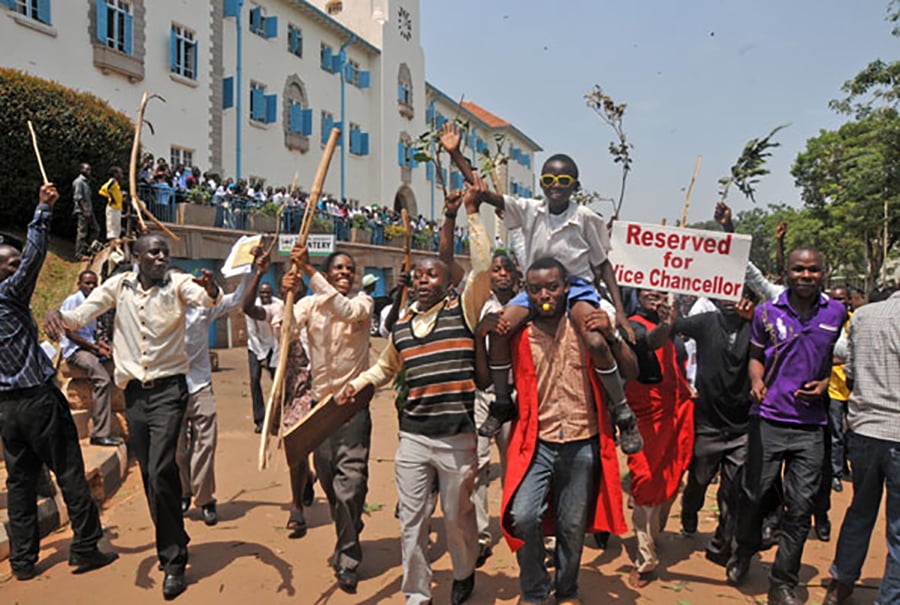
Based on the current affairs, it is almost impossible to get an eternal solution to strikes in universities. This is because government universities where this happens a lot, tend to change administrators every now and then.
It therefore breeds a gap between the students and the administration just in case the new administration has new methods that the students are rather uncomfortable with.
However, there are still a couple of measures that, if followed, there will be low chances of seeing a strike. Here they are.
1. Bridge the communication gap between teachers and students
The university should set channels through which students can express their opinions on the issues they notice at the campus. These can include;
- Suggestion boxes
- Social media channels
- Physical meetings
In every society with a leader, the common people don’t ever want to feel like they’re forced to keep their emotions bottled up, for fear of the consequences of speaking up. Likewise, promoting free speech at these learning institutions is paramount in maintaining order and harmony.
2. All changes should be announced earlier
Abrupt changes especially in school fees are a great disruptor of the political situation at any university. Therefore, crucial changes should be announced at least a year earlier, so that parents and students are ready. The changes include;
- Changes in the school fees/ tuition structure.
- Changes in the academic calendar.
- Implementation of rather different additional rules.
- Adoption of a new system of work that usually requires a payment.
Late communication (usually after implementation) is gravely dangerous to the state of the school, and jeopardizes the state of affairs there.
3. All students should be treated equally
Students have natural differences, some of which they aren’t proud. However, they don’t want to feel like they are left out or discriminated against. Some of the factors for discrimination include;
- Race/ ethnicity
- Gender
- Academic performance
- Physical state (illnesses, body quirks, etcetera)
- Socio-economic background.
With discrimination, there’s almost no political system that can survive for long enough. Therefore, you don’t want to change in the face of chaos.
Alternatively, some institutions make it clear that they can’t accommodate students with certain disabilities due to the fact that they don’t have the requirements necessary to facilitate their learning process.
4. Human rights should be upheld, even in penalization
When strikes are held and the police quells them with brutal force, the fear doesn’t make students comply. Instead, it makes them more stubborn in the face of such threats, especially in cases like;
- Shooting of rubber bullets in the crowds.
- Injuring or harming certain students that have taken part
- Killing student(s) during the strike, whether intentionally or otherwise.
- Abduction of the ringleaders, while their peers know nothing about their whereabouts
- Torture of the suspected participants in the strikes.
When human rights are violated by the higher authorities, the rest of the group believe that through striking again, they can cause change or even be compensated for the damages.
5. Administrators should exercise political neutrality
With Uganda’s current political climate, it is not safe to run an institution with youthful people when you’re not politically neutral, or pretentious about it.
Chancellors and Vice Chancellors with political ties, usually tend to support or facilitate demonstrating students that are on the same side as them.
Also, they are known to administer no penalty whatsoever to these students even if the strikes have been finally calmed down.
6. Penalties should be put in place.
For the students that strike because they want to build a political career and those that succumb to the bandwagon effect, should be penalized for their actions. Examples include;
- Expulsion
- Suspension
- Fines
- Cutting off their points
- Lawsuit.
If they know that nobody gets away with disrupting the school status quo, it significantly reduces the number of students that participate in strikes for fun or bandwagon.
7. Students behavior should be monitored to avoid surprises
As in business, if you don’t monitor it, then you don’t know it. Students will always surprise you with a strike every time you piss them off, because you didn’t study their behaviour and act accordingly. Here’s how to do it.
- Install CCTV cameras in and around the premises.
- Study the behaviour of your students and don’t ignore even the slightest change.
- Have spies among them.
- Set behavioural standards and see who violates them.
By keeping a close eye on your students, you are abstaining from all forms of surprises – especially the extreme chaotic ones.
8. Services should be proportionate to the school fees paid.
Some students, when asked about why they are striking, they claim that the system doesn’t offer what is proportionate to the tuition they are required to pay.
It is therefore important for the administrators to do the following;
- Eliminate all corrupt officials as soon as you detect them
- Uphold the rights of all students
- Don’t make promises you can’t keep.
Conclusion;
To be honest, there’s no perfect way that you can appease your students or staff. However, the methods above create sensible truces between you and them, making the school safer most times.

Comments are closed.